HVAC Systems
Green Benefits of Heat Pump HVAC Systems

Envision a universe where heating and cooling our living spaces contributes minimally to carbon emissions. This vision is made possible through the adoption of heat pump HVAC systems. Like a refreshing wind, these systems cut down on carbon dioxide output, boost energy conservation, and tap into renewable energy resources.
Not only do they lower operating costs, but they also improve indoor air quality. With their long lifespan and durability, heat pump HVAC systems decrease our dependence on fossil fuels.
It’s time to embrace these green benefits and create a more sustainable future.
Key Takeaways
- Reduced carbon emissions
- Lower energy consumption
- Utilization of renewable energy sources
- Contribution to reducing global warming and air pollution
Reduced Carbon Emissions
With a heat pump HVAC system, we can significantly reduce carbon emissions. Heat pumps are a sustainable heating solution that can greatly contribute to carbon footprint reduction. The traditional HVAC systems rely on burning fossil fuels, such as natural gas or oil, to generate heat. This combustion process releases carbon dioxide and other greenhouse gases into the atmosphere, contributing to global warming.
In contrast, heat pumps work by transferring heat from one place to another, using electricity as the energy source. This process is much more energy-efficient and produces significantly lower carbon emissions. According to the U.S. Department of Energy, heat pumps can reduce carbon emissions by up to 40% compared to traditional heating systems.
Energy Efficiency
We can also improve our energy efficiency by using heat pump HVAC systems. Energy conservation and sustainable living are important aspects of green living, and heat pump systems offer a practical solution.
Heat pumps work by transferring heat from one location to another, rather than using energy to generate heat. This process makes them highly efficient, with some models capable of achieving an energy efficiency ratio (EER) of up to 13 or higher. By reducing the amount of energy needed for heating and cooling, heat pump HVAC systems contribute to energy conservation and lower utility bills.
This means that not only are they environmentally friendly, but they also save homeowners money in the long run. Transitioning to renewable energy sources is the next step in our journey towards a greener future.
Renewable Energy Source
Using a heat pump HVAC system allows us to tap into a renewable energy source for heating and cooling our homes. Heat pumps are capable of extracting heat from the air, ground, or water, which are considered renewable resources. This renewable energy potential makes heat pump systems an environmentally sustainable option for households.
According to the U.S. Department of Energy, heat pumps can provide heating and cooling efficiencies of up to 300%, meaning they can produce three times more energy than they consume. This high energy efficiency translates into reduced greenhouse gas emissions and lower energy consumption.
Lower Operating Costs
When considering the green benefits of heat pump HVAC systems, lower operating costs are a key advantage. These systems offer energy-efficient savings by utilizing renewable energy sources, resulting in reduced energy consumption and lower utility bills.
Additionally, heat pump HVAC systems have a positive environmental impact, as they reduce greenhouse gas emissions and dependence on fossil fuels.
In the long term, the cost benefits of lower operating costs make heat pump HVAC systems an attractive choice for both residential and commercial buildings.
Energy-Efficient Savings
By utilizing heat pump HVAC systems, homeowners can enjoy significant energy-efficient savings, resulting in lower operating costs. This makes heat pumps a cost-effective solution for heating and cooling needs.
Here are three key benefits of energy-efficient savings:
Reduced energy consumption: Heat pumps use electricity to transfer heat rather than generating it, resulting in lower energy consumption compared to traditional HVAC systems. This translates to lower utility bills and long-term savings.

Efficient operation throughout the year: Heat pumps are designed to provide both heating and cooling, making them versatile and efficient. They can extract heat from the outdoor air during winter and transfer it indoors for heating. In summer, they can reverse the process, providing cool air indoors while expelling heat outside.
Incentives and rebates: Many governments and utility companies offer incentives and rebates for installing energy-efficient heat pump systems. These financial benefits further reduce the upfront costs and make heat pumps an even more attractive choice.
With these energy-saving benefits and cost-effective solutions, heat pump HVAC systems offer a compelling option for homeowners looking to reduce their operating costs while maintaining a comfortable indoor environment.
Transitioning into the next subtopic, let’s now explore the environmental impact reduction achieved by heat pump HVAC systems.
Environmental Impact Reduction
Our goal is to highlight the environmental impact reduction and lower operating costs associated with heat pump HVAC systems. These systems offer significant benefits in terms of carbon footprint reduction and sustainable heating.
Heat pumps use renewable energy sources, such as air, water, or ground, to provide heating and cooling, resulting in lower greenhouse gas emissions compared to traditional HVAC systems. According to the U.S. Department of Energy, heat pumps can reduce carbon emissions by up to 40% compared to furnaces and boilers. This reduction in carbon footprint not only helps mitigate climate change but also contributes to a cleaner and healthier environment.
Additionally, heat pump systems have lower operating costs due to their high energy efficiency, resulting in long-term savings for homeowners and businesses. By investing in heat pump HVAC systems, not only can we reduce our environmental impact but also save money in the process.
Long-Term Cost Benefits
We can achieve significant long-term cost benefits with heat pump HVAC systems due to their lower operating costs. Switching to a heat pump can result in substantial energy savings, leading to reduced utility bills and increased return on investment.
Here are three key reasons why heat pump HVAC systems offer long-term cost benefits:
Energy Efficiency: Heat pumps are highly efficient, using electricity to transfer heat rather than generating it. This results in lower energy consumption and reduced utility costs.
Reduced Maintenance: Heat pump systems have fewer moving parts compared to traditional HVAC systems, leading to lower maintenance and repair expenses over time.
Government Incentives: Many governments offer financial incentives and rebates for installing energy-efficient heat pump systems. These incentives can further reduce the upfront costs and enhance the long-term cost benefits.

Improved Indoor Air Quality
When it comes to improved indoor air quality, heat pump HVAC systems offer several benefits.
Firstly, these systems are effective at reducing allergens in the air, such as dust, pollen, and pet dander, which can lead to allergies and respiratory issues.
Secondly, by providing a healthier breathing environment, heat pump HVAC systems can improve overall well-being and comfort.
Lastly, studies have shown that using heat pump HVAC systems can help reduce respiratory issues, such as asthma and bronchitis, by maintaining consistent humidity levels and filtering out pollutants.
Allergen Reduction
Heat pump HVAC systems can reduce allergens in the indoor air by effectively filtering and purifying the air. This leads to several health benefits and improved sleep quality.
Reduced allergens: By capturing and filtering out allergens such as dust, pollen, and pet dander, heat pump HVAC systems create a cleaner and healthier breathing environment.
Improved respiratory health: With fewer allergens in the air, individuals with respiratory conditions such as asthma or allergies can experience a decrease in symptoms and enjoy better overall respiratory health.
Enhanced sleep quality: Breathing in clean and purified air can promote better sleep quality, allowing individuals to wake up feeling refreshed and rejuvenated.

Healthier Breathing Environment
With the use of heat pump HVAC systems, we can enjoy a healthier breathing environment and improved indoor air quality. These systems play a crucial role in maintaining cleaner air, which has a direct impact on our respiratory health.
Heat pumps use advanced filtration systems to remove pollutants, allergens, and dust particles from the air, ensuring that the air we breathe is free from harmful contaminants. According to studies, indoor air quality can be up to five times worse than outdoor air quality, leading to various health issues such as allergies, asthma, and respiratory infections.
Reduced Respiratory Issues
By improving indoor air quality, heat pump HVAC systems can help reduce respiratory issues. This is crucial for creating healthy homes and ensuring clean air for occupants.
Here are three reasons why heat pump HVAC systems are effective in reducing respiratory issues:
Filtration: Heat pump HVAC systems are equipped with high-efficiency air filters that can capture airborne particles, such as dust, pollen, and pet dander. These filters can help remove allergens and irritants from the air, improving indoor air quality and reducing the risk of respiratory issues.
Humidity control: Heat pump HVAC systems can also regulate humidity levels in the home. Maintaining optimal humidity levels can prevent the growth of mold, mildew, and dust mites, which are known triggers for respiratory problems.
Ventilation: Heat pump HVAC systems provide controlled ventilation, ensuring a constant supply of fresh air while removing stale air and pollutants. This continuous exchange of air helps to maintain indoor air quality and reduces the chances of respiratory issues.
Long Lifespan and Durability
We can expect a long lifespan and durability from heat pump HVAC systems. In addition to being a cost-effective investment, these systems contribute to the development of sustainable infrastructure.
Heat pump HVAC systems have an average lifespan of 15 to 20 years, which is longer than traditional HVAC systems. This extended lifespan reduces the need for frequent replacements, resulting in lower maintenance and replacement costs over time. Furthermore, these systems are built to withstand various weather conditions and are less prone to mechanical failures.
This durability not only ensures long-term functionality but also minimizes the environmental impact associated with the production and disposal of HVAC systems. As we explore the benefits of heat pump HVAC systems, it becomes evident that their long lifespan and durability contribute to a decreased dependence on fossil fuels, which we’ll discuss in the subsequent section.
Decreased Dependence on Fossil Fuels
Our decreased dependence on fossil fuels is a significant advantage of heat pump HVAC systems. By utilizing renewable energy sources, these systems contribute to environmental sustainability. Here are three key benefits:
Reduced carbon emissions: Heat pump HVAC systems rely on electricity rather than burning fossil fuels, resulting in significantly lower carbon emissions. According to the U.S. Department of Energy, heat pumps can reduce carbon emissions by up to 50% compared to traditional heating systems.

Energy efficiency: Heat pumps operate by transferring heat rather than generating it, making them highly efficient. On average, heat pumps can provide 3-4 units of heating or cooling for every unit of electricity consumed, resulting in lower energy consumption and decreased reliance on fossil fuels.
Renewable energy integration: Heat pumps can be seamlessly integrated with renewable energy sources such as solar panels or wind turbines. This combination allows for a cleaner and more sustainable heating and cooling solution, further reducing our dependence on fossil fuels.
Frequently Asked Questions
How Does a Heat Pump HVAC System Contribute to Reducing Carbon Emissions?
A heat pump HVAC system contributes to reducing carbon emissions by utilizing renewable energy sources and consuming less energy. It efficiently transfers heat from one place to another, reducing the need for fossil fuel consumption.
What Factors Make Heat Pump HVAC Systems More Energy-Efficient Compared to Traditional Systems?
Heat pump HVAC systems are more energy-efficient compared to traditional systems due to factors such as advanced technology and the ability to transfer heat instead of generating it. This leads to significant cost savings in terms of energy consumption.
Can a Heat Pump HVAC System Be Considered a Renewable Energy Source?
A heat pump HVAC system cannot be considered a renewable energy source, but it is highly energy-efficient. It utilizes a small amount of electricity to transfer heat from one place to another, resulting in significant energy savings.
How Does Using a Heat Pump HVAC System Result in Lower Operating Costs for Homeowners?
Using a heat pump HVAC system can result in lower operating costs for homeowners due to lower maintenance and increased home value. It offers energy-efficient heating and cooling, reducing energy consumption and saving money.
What Are the Specific Ways in Which a Heat Pump HVAC System Improves Indoor Air Quality?
Improvements in indoor air quality with a heat pump HVAC system include the filtration of allergens, reduced humidity levels, and the elimination of combustion by-products. These benefits contribute to a healthier and more comfortable living environment.
What Are the Evolutionary Changes in Eco-Friendly HVAC Systems?
The evolution of eco-friendly hvac systems has introduced various changes. These systems now incorporate advanced technologies and sustainable materials to reduce energy consumption and minimize environmental impact. Innovations such as smart thermostats, geothermal heat pumps, and solar-powered HVAC units have revolutionized the industry, offering increased efficiency and cost savings while promoting eco-conscious practices. The continuous development and adoption of these evolutionary changes aim to create a sustainable future for the heating, ventilation, and air conditioning sector.
Conclusion
In conclusion, heat pump HVAC systems offer a multitude of green benefits.
With reduced carbon emissions, energy efficiency, and the use of renewable energy sources, these systems contribute to a greener and more sustainable future.
Additionally, they lower operating costs, improve indoor air quality, and have a long lifespan.
By decreasing dependence on fossil fuels, heat pump HVAC systems coincide with the goal of creating a cleaner and healthier environment for all.
HVAC Systems
Your Guide to Picking the Perfect Heat Pump

Looking for the perfect heat pump for your home? Look no further!
In our comprehensive guide, we’ve got you covered with all the information you need. We’ll walk you through the factors to consider, explain efficiency ratings, help you size your heat pump correctly, and compare different types.
We’ll even delve into energy efficiency, climate considerations, additional features, installation requirements, and maintenance tips.
Get ready to make an informed decision with our ultimate heat pump guide!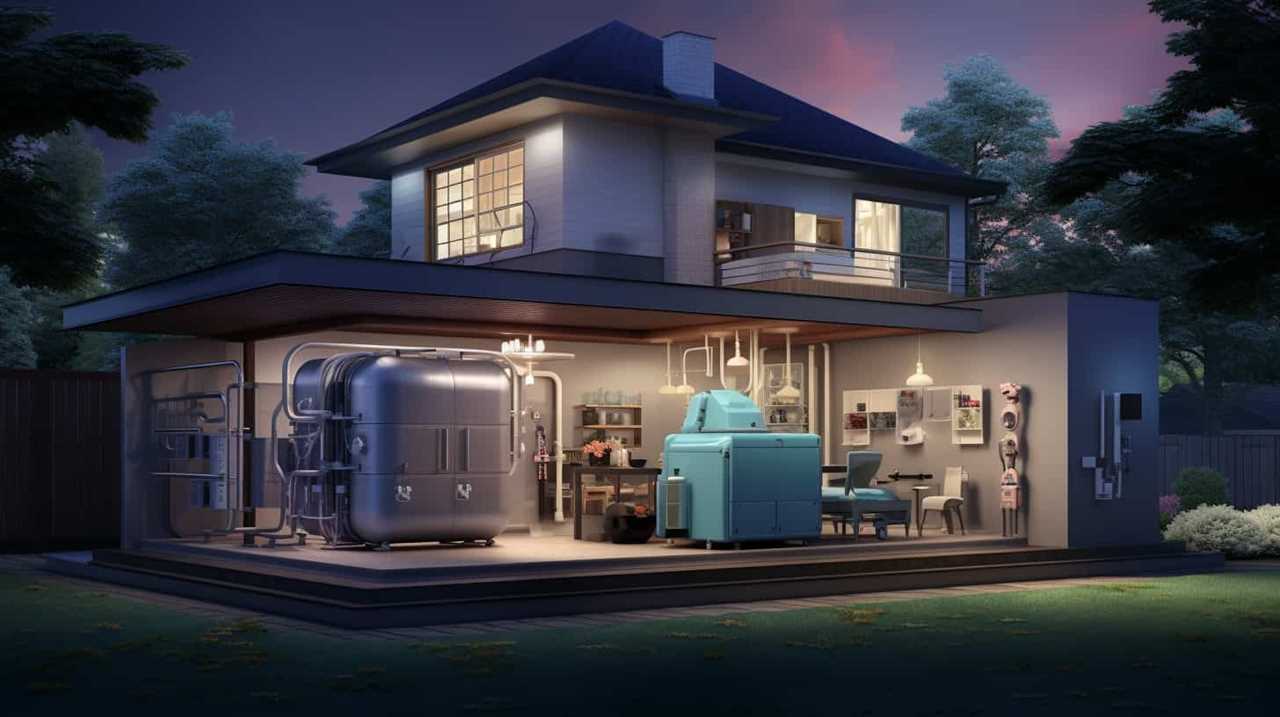
Key Takeaways
- Sizing considerations are crucial when choosing a heat pump, as oversized or undersized units can lead to inefficient operation and increased energy consumption.
- Heat pump efficiency ratings, such as COP and HSPF, should be considered to ensure optimal performance and energy savings.
- Proper installation and maintenance of a heat pump can optimize its efficiency and performance.
- Different types of heat pumps, such as ASHP, GSHP, WSHP, Hybrid Heat Pumps, and Ductless Mini-Split Heat Pumps, offer various benefits and are suitable for different situations.
Factors to Consider When Choosing a Heat Pump
When we’re choosing a heat pump, there are several factors that we need to consider.
Sizing considerations play a crucial role in selecting the right heat pump for your space. It’s important to accurately determine the size of your home or the area you want to heat and cool. Oversized heat pumps can result in inefficient operation and increased energy consumption, while undersized ones may struggle to meet your heating and cooling needs.
Additionally, installation requirements must be taken into account. Heat pumps require proper installation to ensure optimal performance and longevity. Factors such as the location, accessibility, and electrical requirements of the installation site should be considered.
Consulting with a professional HVAC technician can help you determine the appropriate sizing and installation requirements for your heat pump.
Understanding Heat Pump Efficiency Ratings
To fully understand heat pump efficiency ratings, we should examine the different factors that contribute to a heat pump’s overall efficiency. Here are some key points to consider:
-
Heat pump technology advancements: Over the years, heat pump technology has improved significantly, resulting in more efficient systems that can provide better performance and energy savings.
-
Coefficient of Performance (COP) rating: COP measures the ratio of heat output to the electricity input. A higher COP rating indicates greater efficiency.
-
Heating Seasonal Performance Factor (HSPF) rating: HSPF measures a heat pump’s efficiency over an entire heating season. A higher HSPF rating means better energy efficiency.

-
Energy Star certification: Look for heat pumps with the Energy Star label, as they meet strict efficiency guidelines set by the Environmental Protection Agency.
-
Proper installation and maintenance: Ensuring your heat pump is installed correctly and regularly maintained can optimize its efficiency and performance.
Understanding these efficiency ratings will help you make an informed decision when choosing a heat pump that suits your needs.
Now let’s move on to the next section about sizing your heat pump for optimal performance.
Sizing Your Heat Pump for Optimal Performance
We recommend accurately sizing your heat pump for optimal performance by consulting with a professional and considering factors such as the size of your space and climate conditions.
Proper heat pump sizing is crucial as it directly affects the performance and efficiency of the system. If the heat pump is too small for your space, it will struggle to adequately heat or cool your home, resulting in reduced comfort and higher energy bills. On the other hand, if the heat pump is oversized, it will cycle on and off frequently, leading to increased wear and tear and decreased energy efficiency.
A professional can perform a heat load calculation to determine the appropriate size of heat pump for your specific needs, taking into account factors such as insulation levels, window efficiency, and outdoor climate conditions.
Comparing Different Types of Heat Pumps
Let’s compare the various types of heat pumps available to help you make an informed decision. When it comes to heat pump efficiency, there are a few options to consider:
-
Air Source Heat Pumps (ASHP): These pumps extract heat from the outdoor air and transfer it indoors. They’re more affordable upfront but may be less efficient in colder climates.
-
Ground Source Heat Pumps (GSHP): These pumps use the stable temperature of the ground to provide heating and cooling. They’re highly efficient but can be more expensive to install.
-
Water Source Heat Pumps (WSHP): These pumps utilize water as a heat source or sink. They’re efficient but require access to a water source like a lake or pond.
-
Hybrid Heat Pumps: These pumps combine the benefits of an ASHP and a gas furnace. They’re cost-effective and provide efficient heating and cooling.

-
Ductless Mini-Split Heat Pumps: These pumps are ideal for homes without ductwork. They offer individual room control and can be highly efficient.
Consider both the heat pump efficiency and cost when choosing the right type for your home.
Evaluating the Energy Efficiency of Heat Pumps
When evaluating the energy efficiency of heat pumps, there are three key points to consider: the energy-saving benefits, the environmental impact, and the cost-effectiveness.
Heat pumps are known for their ability to save energy by transferring heat from one area to another, rather than generating it. This not only reduces electricity consumption but also lowers utility bills.

Additionally, heat pumps are environmentally friendly as they produce fewer greenhouse gas emissions compared to traditional heating systems.
Lastly, although heat pumps may have a higher upfront cost, their long-term savings and energy efficiency make them a cost-effective choice for homeowners.
Energy-Saving Benefits of Heat Pumps
To accurately assess the energy efficiency of heat pumps, it’s important to evaluate their annual energy performance. By understanding the energy-saving benefits of heat pumps, you can make an informed decision when choosing the perfect heat pump for your needs.
Here are five key benefits to consider:
-
Cost savings: Heat pumps are highly efficient, resulting in lower energy bills compared to traditional heating and cooling systems.
-
Environmental impact: Heat pumps reduce greenhouse gas emissions and help mitigate climate change.
-
Versatility: Heat pumps can provide both heating and cooling, making them a versatile solution for year-round comfort.
-
Long lifespan: With proper maintenance, heat pumps can last up to 20 years, providing long-term energy savings.

-
Incentives and rebates: Many utility companies and government programs offer incentives and rebates to encourage heat pump installation, making them an even more attractive option.
Environmental Impact of Heat Pumps
We can assess the environmental impact of heat pumps by evaluating their energy efficiency and considering their contribution to reducing greenhouse gas emissions.
Heat pumps are known for their ability to transfer heat from one location to another, rather than generating heat directly. This results in significantly lower energy consumption compared to traditional heating and cooling systems.
By using a heat pump, homeowners can reduce their carbon footprint and contribute to environmental sustainability. Heat pumps are designed to maximize efficiency, with advanced technologies such as variable speed compressors and smart controls. These features allow the heat pump to adapt to changing conditions and operate at optimal levels, further reducing energy consumption and greenhouse gas emissions.
When choosing a heat pump, it’s important to consider its energy efficiency rating and look for models that are ENERGY STAR certified, as they meet strict energy efficiency guidelines.
Cost-Effectiveness of Heat Pumps
By evaluating the energy efficiency of heat pumps and considering their cost-effectiveness, we can determine the best option for homeowners. When it comes to choosing a heat pump, it’s important to consider the long-term savings and cost-saving benefits.
Here are five key factors to keep in mind:
-
Energy Efficiency: Heat pumps with higher energy efficiency ratings can save homeowners significant amounts of money on their energy bills.

-
Maintenance Costs: It’s essential to consider the potential maintenance costs associated with different heat pump models.
-
Installation Expenses: The initial cost of installing a heat pump can vary depending on factors such as system size and complexity.
-
Rebates and Incentives: Many utility companies and government entities offer rebates and incentives for homeowners who choose energy-efficient heat pumps.
-
Lifespan: Heat pumps with longer lifespans can provide more cost savings over time, as they require fewer replacements or repairs.

Selecting the Right Heat Pump for Your Climate
In our guide to picking the perfect heat pump, let’s now delve into selecting the right heat pump for your climate. The climate in which you live plays a crucial role in determining the type of heat pump that will work best for you. To help you make an informed decision, consider the following factors: temperature range, humidity levels, and seasonal variations.
| Climate Type | Temperature Range | Humidity Levels | Seasonal Variations |
|---|---|---|---|
| Cold Climate | Below freezing to 20°F | Low | Extreme temperature swings |
| Moderate Climate | 20°F to 50°F | Moderate | Moderate temperature changes |
| Warm Climate | 50°F and above | High | Minimal temperature fluctuations |
Exploring Additional Features and Options
When choosing a heat pump, it’s important to consider the energy efficiency ratings, as these will determine the performance and cost savings of the unit.
Additionally, noise level considerations are crucial, especially if the heat pump will be installed in a bedroom or living area.
Lastly, it’s worth checking if the heat pump is compatible with smart thermostats, as this allows for easy temperature control and energy management.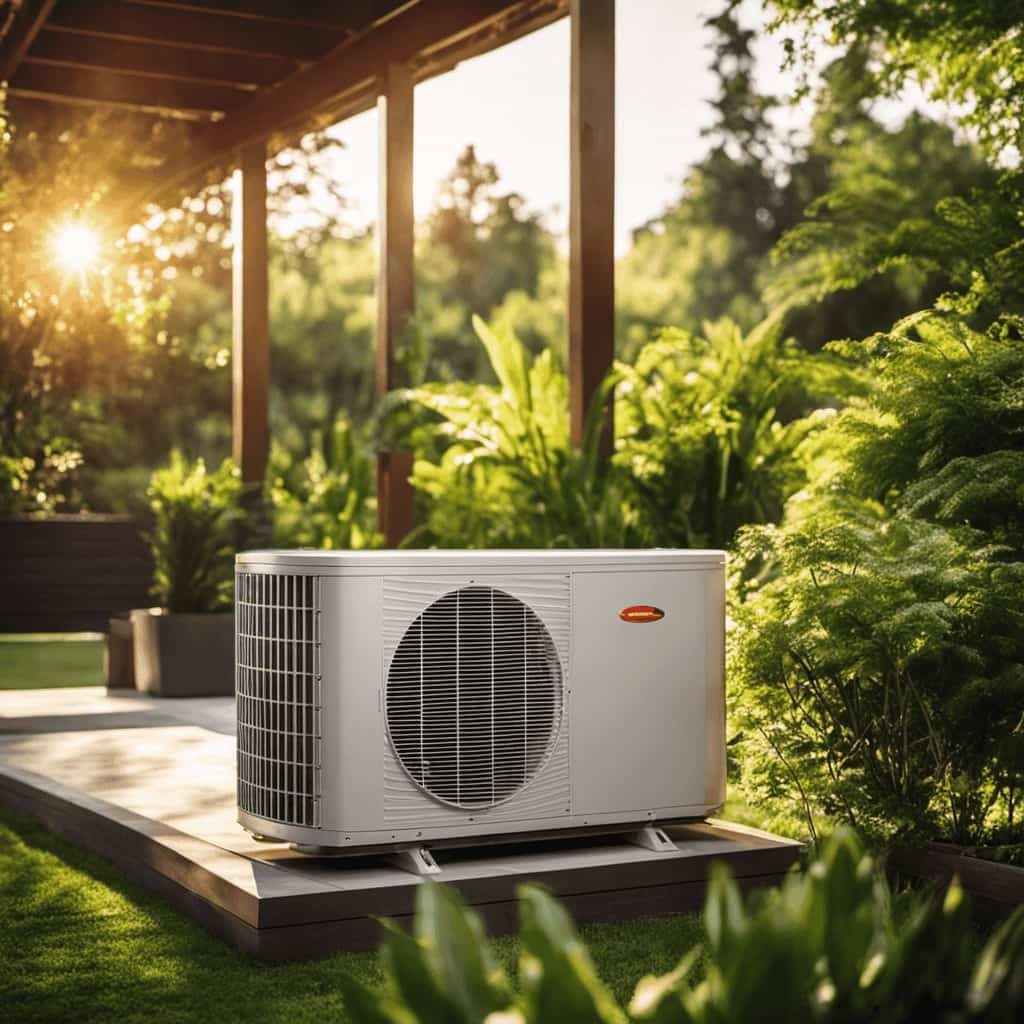
Energy Efficiency Ratings
We recommend considering the Seasonal Energy Efficiency Ratio (SEER) and Heating Seasonal Performance Factor (HSPF) ratings when exploring additional features and options for energy-efficient heat pumps. These ratings provide valuable information regarding the energy efficiency and performance of the heat pump.
Here are five key advantages of energy-efficient heat pumps:
-
Lower Energy Costs: Energy-efficient heat pumps consume less electricity, resulting in lower energy bills.
-
Environmental Benefits: By reducing energy consumption, these heat pumps contribute to a greener and more sustainable future.
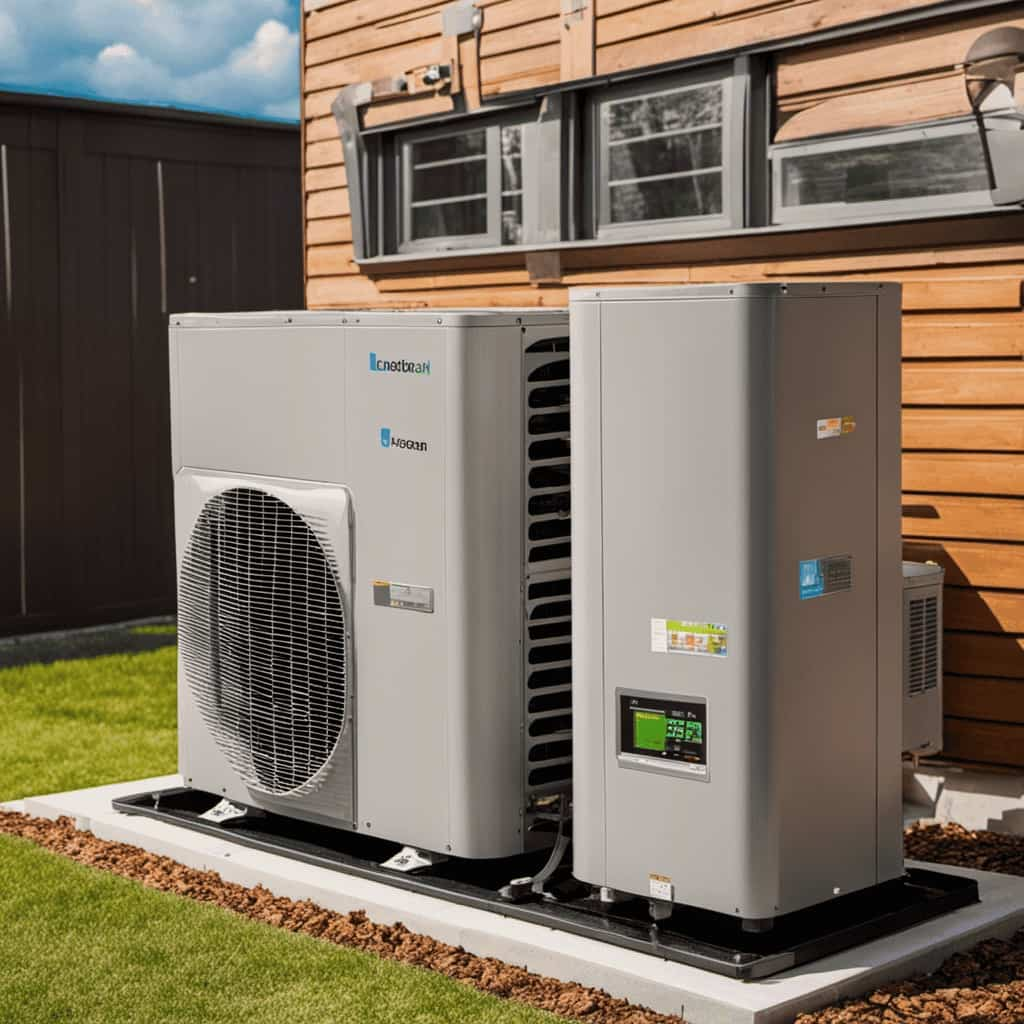
-
Enhanced Comfort: Energy-efficient heat pumps provide consistent heating and cooling, ensuring optimal comfort throughout the year.
-
Longer Lifespan: These heat pumps are built with high-quality components, offering increased durability and longevity.
-
Reduced Maintenance: Energy-efficient heat pumps often require less maintenance, resulting in fewer repair expenses.
Considering these advantages, investing in an energy-efficient heat pump is a wise choice that can provide long-term benefits for both your comfort and your wallet.
Noise Level Considerations
To ensure a quiet and peaceful environment, we recommend considering the noise level of heat pumps when exploring additional features and options. A heat pump with quiet operation is crucial, especially if the unit will be installed near bedrooms, living areas, or other noise-sensitive areas.
When comparing heat pumps, it’s important to look for models that have a low decibel rating. A decibel rating of 50 or less is generally considered quiet.
Additionally, if noise is a concern, there are soundproofing options available. These options include adding sound barriers or insulation around the heat pump, or installing the unit on a soundproofing pad.
Smart Thermostat Compatibility
The smart thermostat compatibility of a heat pump offers additional features and options that we can explore.
With smart home integration, you can control your heat pump remotely using your smartphone or voice commands. This allows for convenient temperature adjustments and energy savings even when you’re not at home.
The programming flexibility of a smart thermostat is another advantage. You can set customized schedules to match your lifestyle and preferences, ensuring optimal comfort and efficiency.
Additionally, smart thermostats often come with advanced features like learning capabilities that adapt to your behavior and weather forecasts that help optimize energy usage.
With smart thermostat compatibility, you can take your heat pump to the next level, making it a valuable addition to your smart home setup.
Assessing Installation Requirements and Costs
Installing a heat pump typically requires 1-3 days of labor, and costs can range from $3,000 to $10,000. The installation process involves several steps to ensure proper functioning and efficiency. First, the location for the heat pump needs to be determined, taking into account factors such as noise levels and access to outdoor air. Next, the necessary electrical and plumbing work needs to be completed. This includes wiring the heat pump to the electrical panel and connecting it to the existing ductwork or installing new ducts if needed. Additionally, budget considerations play a crucial role in the installation process. It’s important to allocate funds for not only the equipment, but also for any necessary upgrades or modifications to the home’s infrastructure. To help you plan your budget, here’s a table outlining the potential costs involved in heat pump installation:
| Installation Cost Factors | Estimated Cost Range |
|---|---|
| Heat Pump Equipment | $1,500 – $6,000 |
| Electrical Work | $500 – $2,000 |
| Plumbing Work | $500 – $2,000 |
| Ductwork Modifications | $500 – $3,000 |
| Permits and Inspections | $200 – $1,000 |
Maintenance Tips for Extending the Lifespan of Your Heat Pump
We can maximize the lifespan of our heat pump by following these maintenance tips:
- Regularly clean or replace air filters to ensure proper airflow and prevent build-up of dirt and debris.
- Keep the outdoor unit clear of leaves, grass, and other obstructions to maintain optimal performance.
- Schedule annual professional maintenance to check for any potential issues and ensure all components are functioning correctly.
- Monitor refrigerant levels and recharge if needed to prevent strain on the system.
- Protect the unit during extreme weather conditions by covering it with a waterproof cover or shelter.
By implementing these maintenance tips, we can extend the lifespan of our heat pump and ensure it operates efficiently for years to come.
Regular upkeep and preventive measures won’t only save us from costly repairs but also help us maintain a comfortable indoor environment throughout the year.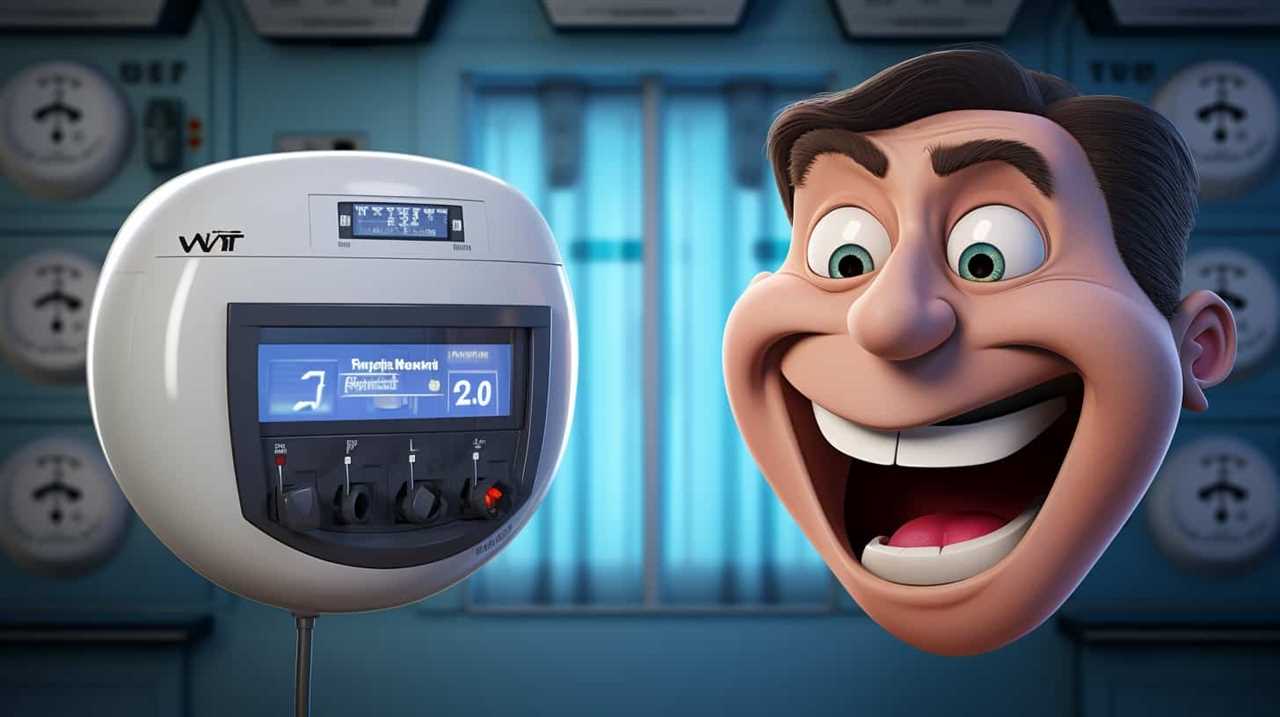
Frequently Asked Questions
Can I Install a Heat Pump Myself, or Do I Need to Hire a Professional?
We can install a heat pump ourselves, but it is recommended to hire a professional for a safer and more efficient installation. DIY installation requires technical knowledge and can void warranties if done improperly.
Are There Any Tax Credits or Incentives Available for Purchasing a Heat Pump?
Tax credits and financial incentives are available for purchasing heat pumps, incentivizing their energy efficiency. While installation costs vary, both DIY and professional installation options exist. Heat pumps have a long lifespan, but eventually require replacement. They provide heating and cooling functionality while minimizing energy consumption and operating costs.
How Long Does a Typical Heat Pump Last Before Needing to Be Replaced?
Heat pumps typically last around 15-20 years before needing replacement. Regular heat pump maintenance, such as cleaning and regular inspections, can help extend its lifespan. Signs of a failing heat pump include reduced heating or cooling performance and increased energy consumption.
Can a Heat Pump Be Used to Both Heat and Cool My Home?
Yes, a heat pump can be used to both heat and cool your home. It offers the benefits of efficient heating and cooling, reducing energy costs. Regular heat pump maintenance tips can ensure optimal performance and longevity.
What Is the Average Cost of Operating a Heat Pump Compared to Other Heating and Cooling Systems?
The average operating cost of a heat pump compared to other heating and cooling systems depends on factors such as energy efficiency. It is important to consider these factors when evaluating the cost effectiveness of different systems.
Conclusion
In conclusion, when it comes to picking the perfect heat pump, it’s crucial to consider factors like efficiency ratings, sizing, and climate suitability.
By evaluating different types, energy efficiency, and additional features, you can make an informed decision.
Remember to assess installation requirements and maintenance tips to ensure optimal performance and extend the lifespan of your heat pump.
So, start your search and select a system that seamlessly suits your needs, providing powerful and efficient heating or cooling all year round.
HVAC Systems
Zero-Cost Guide: Selecting the Perfect HVAC Heat Pump

We understand your worry – selecting the perfect HVAC heat pump can be daunting. But fear not! Our complimentary guide is here to help you out.
In this article, we will walk you through the key considerations, efficiency ratings, sizing, types, features, and installation and maintenance requirements.
With our detailed and informative approach, you’ll be equipped with the knowledge you need to make an informed decision.
Say goodbye to confusion and hello to the perfect heat pump for your HVAC system!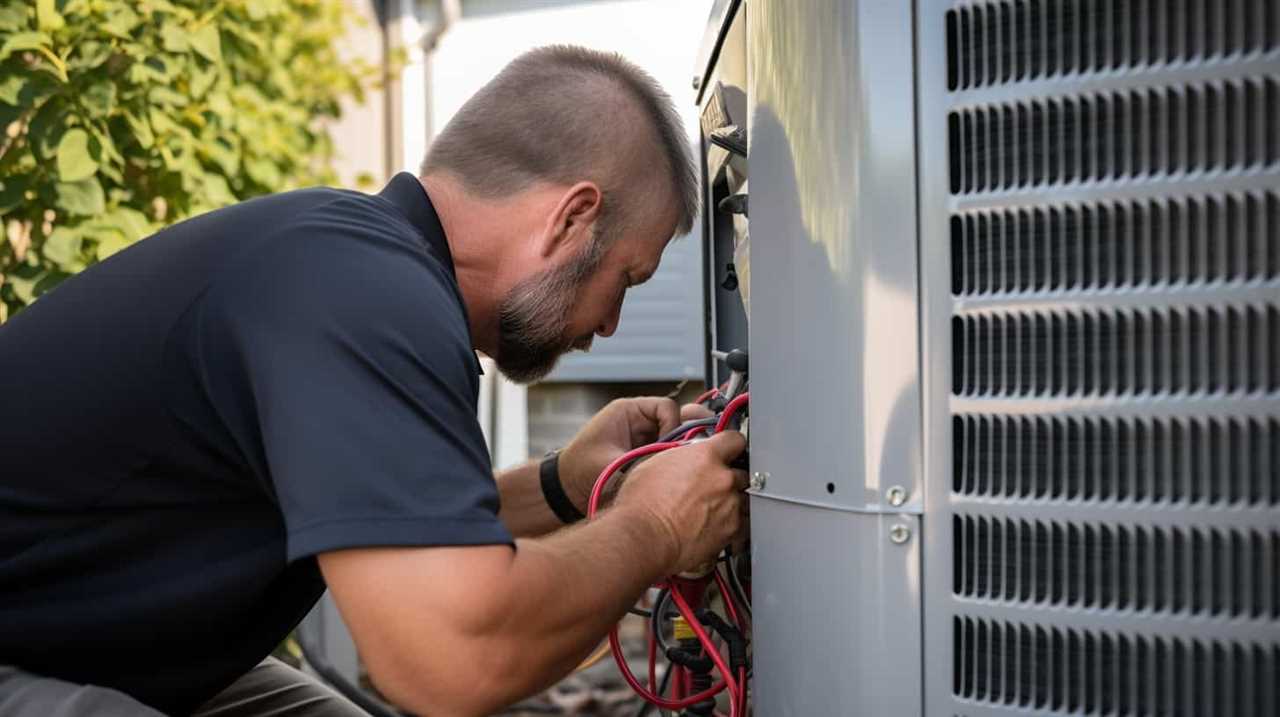
Key Takeaways
- Consider the heat pump brand (e.g. Carrier, Trane, Lennox)
- Look for cost-effectiveness and long-term energy savings
- Ensure reliability and durability of the heat pump
- Consider compatibility with your home’s HVAC system
Key Considerations for Choosing the Right Heat Pump
When selecting the right heat pump, we must consider several key factors. One of the most important considerations is the heat pump brand. It’s crucial to choose a reputable brand that offers reliable and durable products. Some well-known heat pump brands include Carrier, Trane, and Lennox.
Another factor to consider is cost-effectiveness. It’s essential to find a heat pump that not only fits your budget but also provides long-term energy savings. Many brands offer cost-effective options that are energy-efficient and can help reduce your utility bills.
By choosing the right heat pump brand and considering cost-effective options, you can ensure that you’re making a wise investment in your home’s HVAC system.
Now, let’s delve into understanding efficiency ratings and energy savings.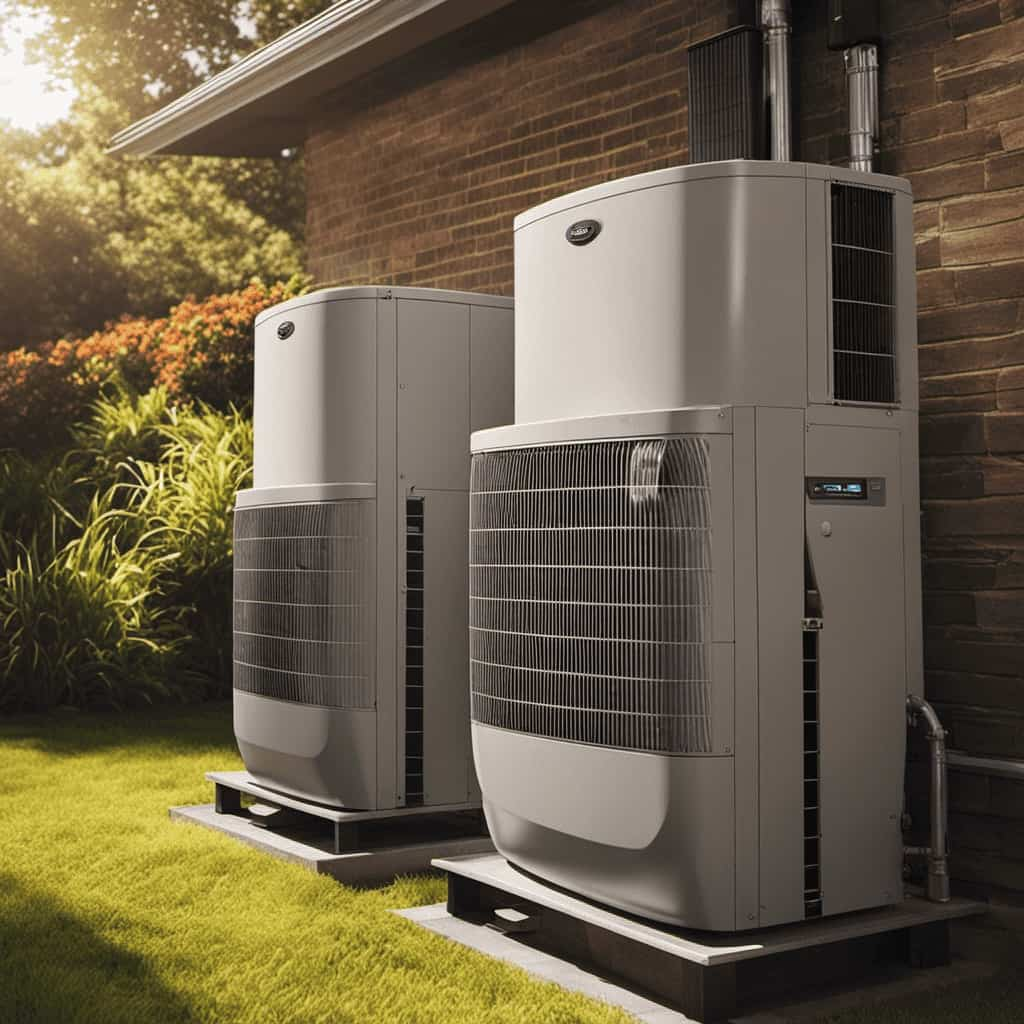
Understanding Efficiency Ratings and Energy Savings
To understand efficiency ratings and energy savings, we must consider the different factors that contribute to a heat pump’s performance. Efficiency ratings are a measure of how effectively a heat pump converts energy into useful heating or cooling. The higher the rating, the more efficient the heat pump is, resulting in lower energy consumption and cost savings.
Energy savings can be achieved by selecting a heat pump with a high Seasonal Energy Efficiency Ratio (SEER) and Heating Seasonal Performance Factor (HSPF). Additionally, features such as variable-speed motors and smart thermostats can further improve indoor air quality and maximize comfort levels.
By prioritizing efficiency ratings and energy savings, homeowners can’t only reduce their carbon footprint but also enjoy a more comfortable and cost-effective HVAC system.
Now, let’s move on to the next section and discuss how to properly size your heat pump to match your HVAC system.

Sizing Your Heat Pump: Matching It to Your HVAC System
In order to properly size our heat pump and ensure it matches our HVAC system, we need to consider the specific heating and cooling requirements of our home.
Heat pump capacity is a crucial factor to consider. It refers to the amount of heating or cooling that a heat pump can provide. To determine the correct capacity, we must calculate the heating and cooling load of our home. This involves considering factors such as the size of our home, insulation levels, number of windows, and local climate.
Additionally, heat pump efficiency is another important consideration. It determines how effectively the heat pump converts energy into heating or cooling. Higher efficiency heat pumps can provide cost savings in the long run.
Exploring Different Heat Pump Types and Features
We will now explore the various types and features of heat pumps to help us make an informed decision.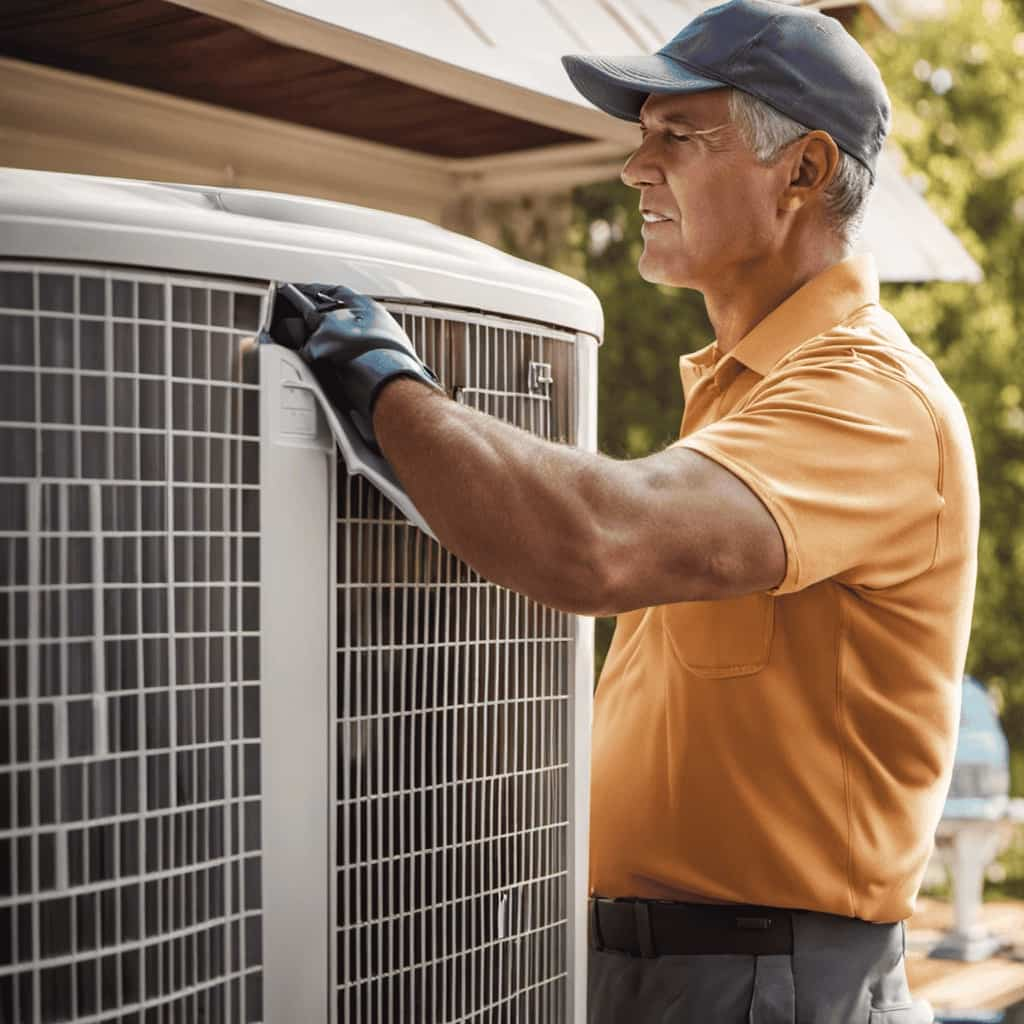
When comparing heat pump prices, it’s important to consider the initial cost as well as the long-term savings on energy bills.
Some innovative heat pump technologies to consider include:
Variable-speed compressors: These heat pumps adjust their speed based on the heating or cooling needs of your home, resulting in increased energy efficiency and improved comfort.
Two-stage heat pumps: These heat pumps have two different operating speeds, allowing them to run at a lower speed for milder weather and a higher speed for extreme temperatures.

Geothermal heat pumps: These heat pumps utilize the stable temperature of the ground to provide efficient heating and cooling, making them an environmentally friendly option.
Exploring these different types and features will help you choose the heat pump that best fits your needs and budget.
Evaluating Installation and Maintenance Requirements
When considering a heat pump, it’s important for us to evaluate the installation and maintenance requirements. Evaluating performance and cost comparison are crucial steps in this process.
Firstly, evaluating the performance of a heat pump involves looking at its heating and cooling capacity, energy efficiency, and noise levels. It’s important to choose a heat pump that meets the specific heating and cooling needs of your space while also being energy efficient and quiet.
Secondly, cost comparison is essential in determining the long-term affordability of a heat pump. This involves considering the initial installation costs, as well as the ongoing maintenance and energy costs. It’s important to choose a heat pump that provides the best value for your budget, taking into account both the upfront and long-term expenses.
Frequently Asked Questions
Can I Install a Heat Pump Myself, or Do I Need to Hire a Professional for Installation?
Installing a heat pump yourself may save money initially, but it comes with risks. Hiring a professional ensures proper installation, preventing damage and potential safety hazards. They have the expertise and knowledge to handle the job efficiently and effectively.
Are Heat Pumps Suitable for All Climates, or Are There Certain Regions Where They Are More Effective?
Heat pump efficiency is influenced by climate. While heat pumps work in all climates, they are more effective in moderate climates. Extreme cold or hot regions can reduce their performance, making additional heating or cooling sources necessary.
How Can I Determine the Right Size of Heat Pump for My Home?
Determining the right size of a heat pump for our home involves calculating the heat pump capacity. It’s essential to consider factors such as square footage, insulation, and climate to ensure optimal performance and energy efficiency.
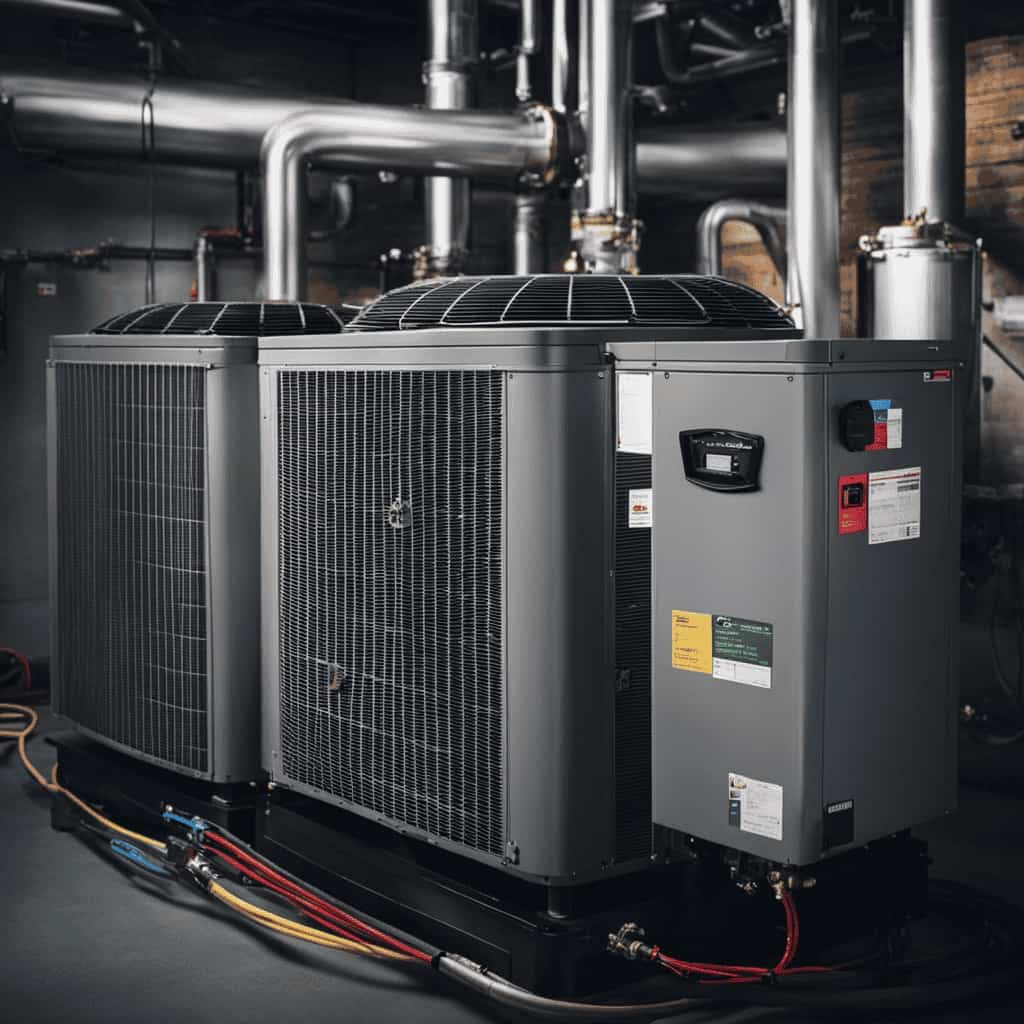
Are There Any Tax Credits or Rebates Available for Purchasing and Installing a Heat Pump?
Yes, there are tax credits and rebates available for purchasing and installing a heat pump. These incentives promote energy efficiency and can provide significant cost savings.
What Kind of Maintenance Does a Heat Pump Require, and How Often Should It Be Performed?
Heat pump maintenance is essential for optimal performance. Regularly cleaning or replacing air filters, inspecting outdoor unit coils, and checking refrigerant levels are necessary. It should be done annually to ensure efficient operation and prolong the lifespan of the heat pump.
Are Heat Pumps Included in the HVAC System?
When considering an HVAC system, one should not overlook the importance of picking the ideal heat pump. Heat pumps are indeed included in most HVAC systems as they efficiently provide both heating and cooling functions. With their ability to transfer heat from one area to another, heat pumps play a crucial role in maintaining desired indoor temperatures throughout the year.
Conclusion
After considering key factors such as efficiency ratings, sizing, and features, it becomes clear that selecting the perfect HVAC heat pump requires careful research and analysis.
The truth is that investing time and effort into understanding the options available can lead to significant energy savings and a more comfortable living environment.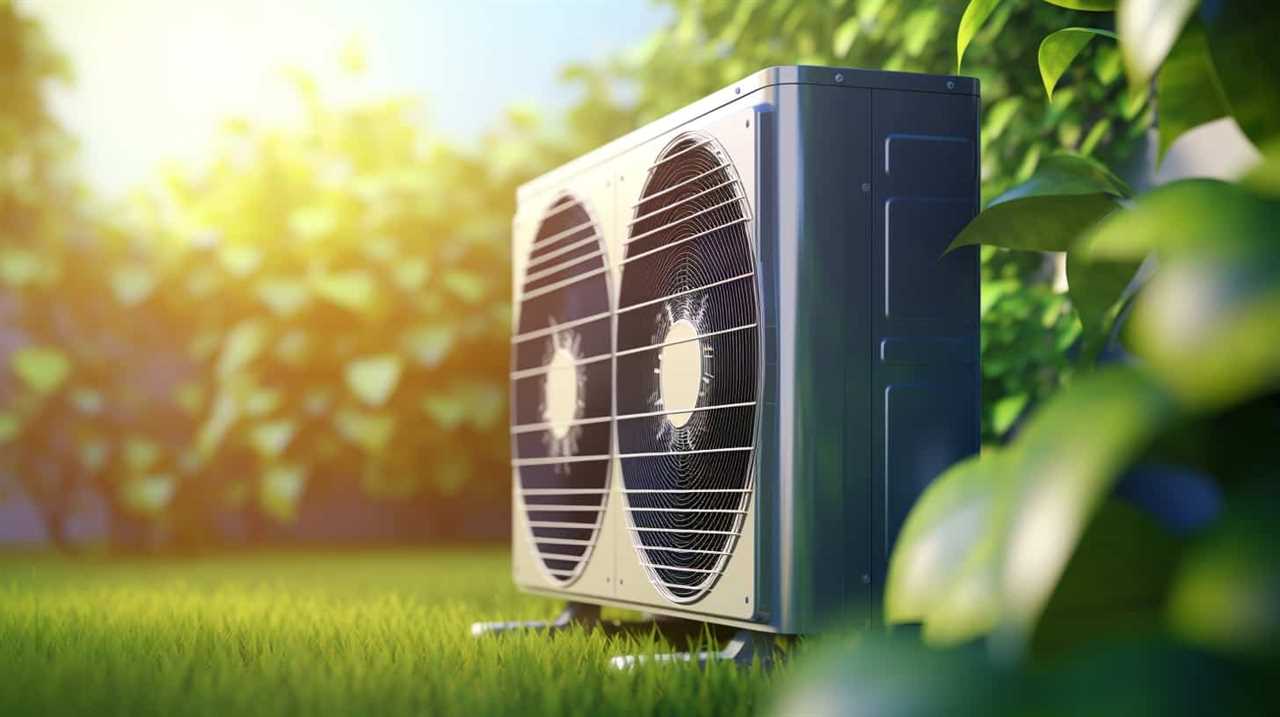
So, don’t hesitate to explore different types of heat pumps and evaluate installation and maintenance requirements to make an informed decision that meets your specific needs.
HVAC Systems
Unveiling High-Quality HVAC Systems With Heat Pumps

We thought we knew everything there was to know about HVAC systems with heat pumps. However, we were completely wrong.
In this eye-opening article, we’ll reveal the secrets of high-quality HVAC systems with heat pumps, uncovering the impressive features and energy-saving benefits that will leave you wondering why you didn’t upgrade sooner.
From efficiency ratings to troubleshooting tips, we’ve got you covered.
Get ready to be blown away by the innovative technologies and performance of modern HVAC systems with heat pumps.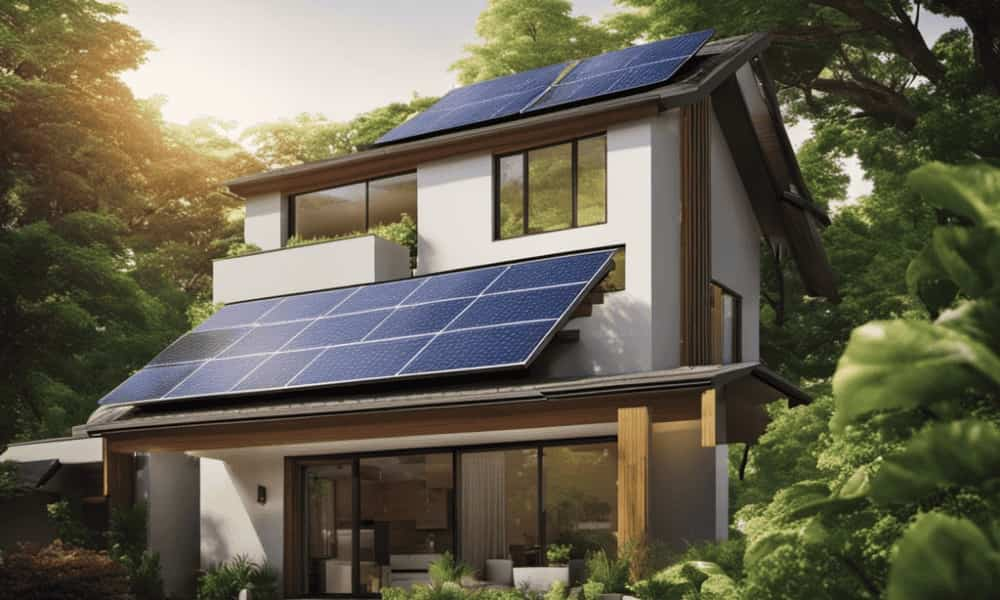
Let’s dive in.
Key Takeaways
- High-quality HVAC systems with heat pumps offer energy efficient technology that reduces energy consumption and saves money on bills.
- These systems use advanced sensors to detect temperature changes and adjust for optimal comfort.
- Variable speed motors enhance energy efficiency by operating at different speeds.
- HVAC systems with heat pumps provide effective heating and cooling without compromising performance, offering both comfort and energy savings.
Key Features of High-Quality HVAC Systems With Heat Pumps
Our high-quality HVAC systems with heat pumps offer key features that enhance energy efficiency and provide optimal comfort. With our energy efficient technology, we’ve designed our systems to consume less energy while still ensuring effective heating and cooling. This not only reduces your carbon footprint, but also saves you money on your energy bills.
Our cost effective solutions are designed to provide maximum comfort without compromising on performance. Our HVAC systems are equipped with advanced sensors that detect changes in temperature and adjust accordingly, ensuring that your home or office always stays at the desired temperature. Additionally, our systems use variable speed motors, allowing them to operate at different speeds depending on the heating or cooling needs, further enhancing energy efficiency.
With our high-quality HVAC systems with heat pumps, you can enjoy both comfort and energy savings.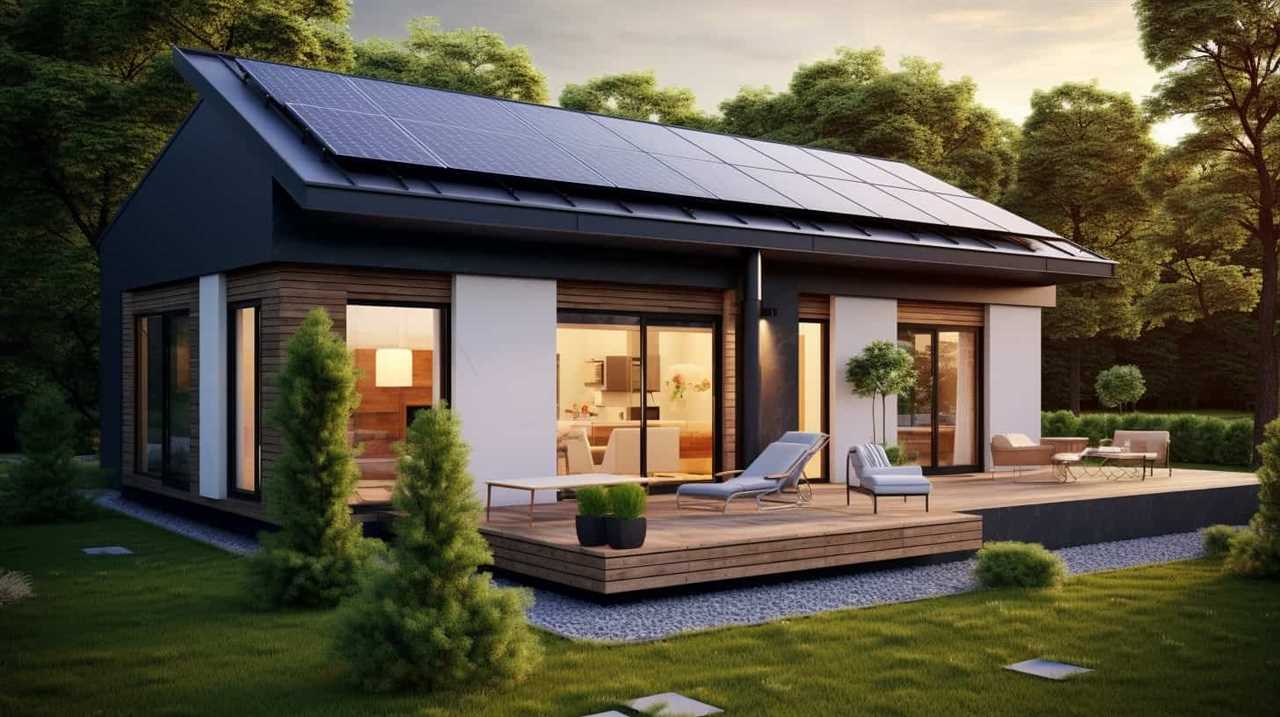
Benefits of Investing in Top Rated HVAC Systems With Heat Pumps
Investing in top rated HVAC systems with heat pumps offers numerous benefits, including increased energy efficiency and improved indoor air quality. These systems utilize energy efficient technology to provide cost effective solutions for heating and cooling needs.
Here are three key benefits of investing in top rated HVAC systems with heat pumps:
Energy Efficiency: HVAC systems with heat pumps use advanced technology to transfer heat from the air or ground, reducing the need for traditional heating and cooling methods. This results in lower energy consumption and reduced utility bills.
Improved Indoor Air Quality: HVAC systems with heat pumps not only regulate temperature but also filter and purify the air, removing pollutants, allergens, and odors. This leads to a healthier and more comfortable indoor environment.

Reduced Environmental Impact: By using energy efficient technology, top rated HVAC systems with heat pumps help reduce greenhouse gas emissions, contributing to a greener and more sustainable future.
Understanding the efficiency ratings of HVAC systems with heat pumps will further enhance your knowledge of their benefits.
Understanding the Efficiency Ratings of HVAC Systems With Heat Pumps
We should first understand the efficiency ratings of HVAC systems with heat pumps to make informed decisions about their energy-saving potential. Efficiency ratings indicate how well a system converts energy into useful heating or cooling, and are measured by two key metrics: Seasonal Energy Efficiency Ratio (SEER) and Heating Seasonal Performance Factor (HSPF). SEER measures the cooling efficiency of the system, while HSPF measures the heating efficiency. Both ratings are represented by a numerical value, with higher numbers indicating higher efficiency.
When comparing different HVAC systems with heat pumps, it’s important to look for higher SEER and HSPF ratings, as this will result in lower energy consumption and reduced utility bills. Understanding the efficiency ratings of HVAC systems with heat pumps allows us to evaluate their energy-saving potential and choose the most efficient option for our needs.

Now, let’s transition into the next section where we’ll explore different types of heat pumps for HVAC systems.
Exploring Different Types of Heat Pumps for HVAC Systems
When considering HVAC systems with heat pumps, it’s important to explore the different types available in order to make an informed decision. Here are three types of heat pumps commonly used in HVAC systems:
Geothermal Heat Pumps: These systems utilize the stable temperature of the earth to provide heating and cooling. They extract heat from the ground during winter and transfer heat into the ground during summer. Geothermal heat pumps are highly efficient and can significantly reduce energy consumption.
Air Source Heat Pumps: These systems extract heat from the outdoor air and transfer it indoors during winter, and vice versa during summer. They’re more affordable and easier to install compared to geothermal heat pumps. However, their efficiency may be affected by extreme temperatures.

Hybrid Heat Pumps: These innovative systems combine the efficiency of geothermal heat pumps with the versatility of air source heat pumps. They automatically switch between the two heat sources based on outdoor conditions, maximizing efficiency and comfort.
Factors to Consider When Choosing a High-Quality HVAC System With Heat Pump
One important factor to consider when choosing a high-quality HVAC system with a heat pump is the energy efficiency rating. Energy efficiency is crucial because it directly impacts the system’s operating costs and environmental impact.
When evaluating the energy efficiency of an HVAC system with a heat pump, it’s essential to look for a high Seasonal Energy Efficiency Ratio (SEER) and Heating Seasonal Performance Factor (HSPF) rating. The SEER measures the cooling efficiency, while the HSPF measures the heating efficiency of the system. A higher SEER and HSPF rating indicate a more energy-efficient system, which can result in lower energy bills and reduced carbon emissions.
Additionally, it’s important to consider the energy efficiency of the heat pump itself, as this will affect the overall efficiency of the system.
The Importance of Proper Sizing for HVAC Systems With Heat Pumps
Proper sizing is crucial for ensuring optimal performance and efficiency of HVAC systems with heat pumps. When it comes to HVAC systems, size matters. Here are three reasons why proper sizing is essential for these systems:
Efficiency: A properly sized HVAC system with a heat pump will operate at its peak efficiency. Undersized systems may struggle to meet the heating or cooling demands, leading to increased energy consumption and higher utility bills. Oversized systems, on the other hand, tend to cycle on and off frequently, wasting energy and reducing comfort.
Proper Installation: Properly sizing an HVAC system ensures that it’s installed correctly. This includes selecting the right equipment, ductwork, and controls. A system that’s too small or too large may require modifications to accommodate the size, compromising its performance and efficiency.
Energy Efficiency: Properly sized HVAC systems with heat pumps can significantly improve energy efficiency. By matching the system’s capacity to the heating and cooling needs of the space, it can efficiently maintain a comfortable indoor environment while minimizing energy waste.

Tips for Maintaining and Extending the Lifespan of HVAC Systems With Heat Pumps
To ensure peak performance and longevity of our HVAC systems with heat pumps, it’s important to follow these tips for maintenance and extending their lifespan.
Regular maintenance is crucial for maintaining efficiency and preventing potential problems. Start by regularly cleaning or replacing air filters, as dirty filters can restrict airflow and reduce system efficiency. Additionally, clean the outdoor unit by removing any debris that could obstruct airflow. Inspect the refrigerant lines for leaks and ensure proper refrigerant levels. Lubricate the motor and other moving parts to reduce friction and wear. It’s also important to check and calibrate thermostats regularly to ensure accurate temperature control. Lastly, if any issues arise, troubleshoot problems promptly to prevent further damage.
By following these maintenance tips, you can maximize the lifespan and efficiency of your HVAC system with a heat pump.
Transition: Now that we’ve discussed the importance of maintaining and extending the lifespan of HVAC systems with heat pumps, let’s delve into the next section, where we’ll compare the performance of different HVAC systems with heat pumps.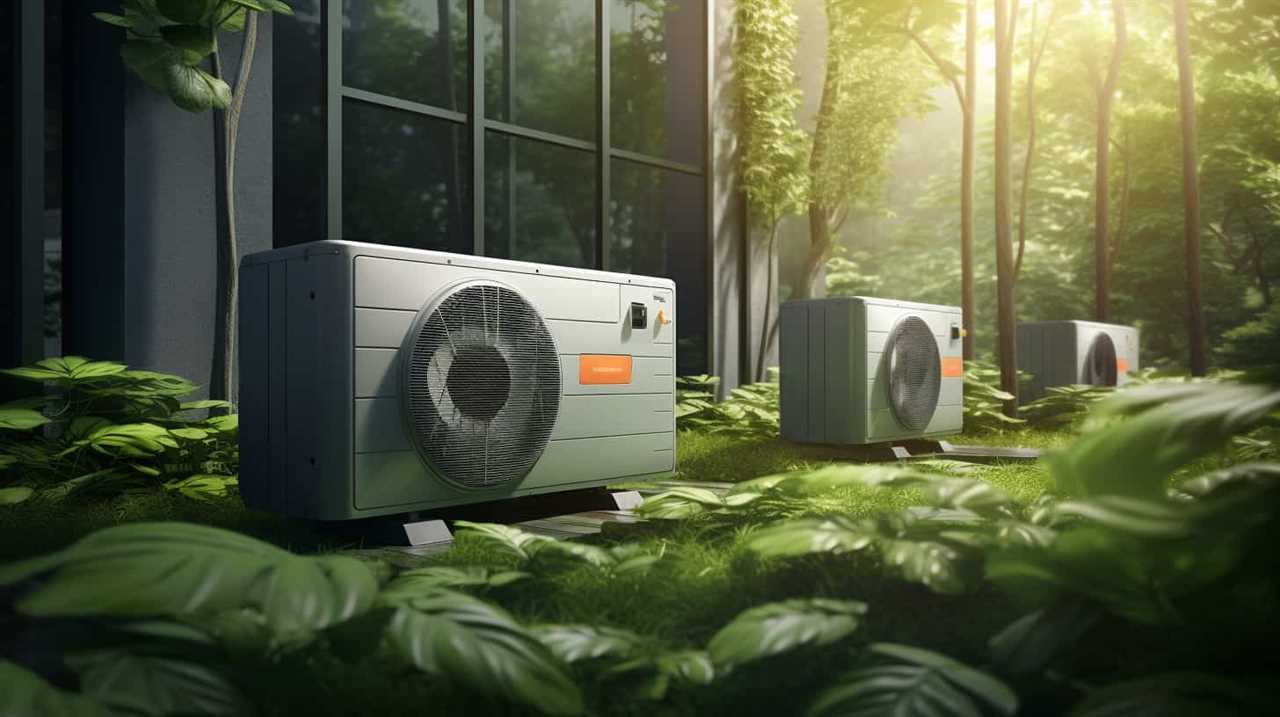
Comparing the Performance of Different HVAC Systems With Heat Pumps
When comparing the performance of different HVAC systems with heat pumps, we need to consider their energy efficiency, heating and cooling capacities, as well as their noise levels.
Here are three key factors to consider when comparing energy efficiency and cost effectiveness:
Seasonal Energy Efficiency Ratio (SEER): SEER measures the cooling efficiency of an HVAC system. The higher the SEER rating, the more energy-efficient the system is and the lower your cooling costs will be.
Heating Seasonal Performance Factor (HSPF): HSPF measures the heating efficiency of an HVAC system. Similar to SEER, a higher HSPF rating indicates better energy efficiency and lower heating costs.
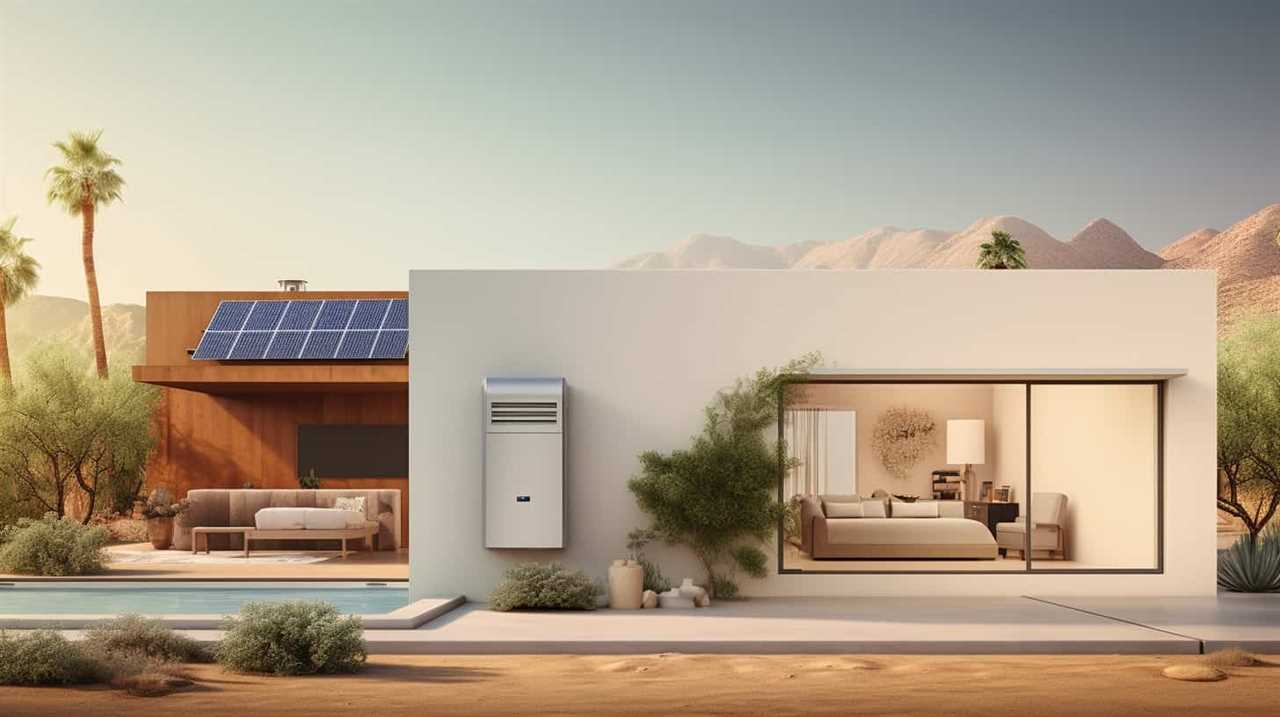
Coefficient of Performance (COP): COP is a measure of the heating or cooling output of an HVAC system divided by the energy input. A higher COP indicates better energy efficiency, resulting in lower energy costs.
Energy-Saving Features to Look for in High-Quality HVAC Systems With Heat Pumps
We frequently prioritize energy-saving features and actively seek out high-quality HVAC systems with heat pumps.
When it comes to energy efficiency, there are several key features to look for in a high-quality HVAC system. One important feature is the use of energy-efficient technology, such as variable-speed compressors and advanced control systems. These technologies allow the system to adjust its output based on the heating or cooling demands, resulting in reduced energy consumption and greater cost savings.
Another feature to consider is the use of smart thermostats, which can learn your habits and adjust the temperature accordingly, optimizing energy usage.
Additionally, high-quality insulation and well-sealed ductwork are essential for preventing energy loss and ensuring maximum efficiency.
Common Issues and Troubleshooting Tips for HVAC Systems With Heat Pumps
One of the most common issues that we encounter with HVAC systems with heat pumps is a loss of heating or cooling capacity. This can be caused by a variety of factors, including a malfunctioning compressor, refrigerant leakage, or a faulty thermostat.
To troubleshoot this issue, here are three common maintenance issues and troubleshooting techniques:
Check the air filters: Dirty or clogged air filters can restrict airflow and reduce the system’s efficiency. Regularly clean or replace the filters to ensure proper airflow.

Inspect the outdoor unit: Ensure that the outdoor unit is free from debris, such as leaves or dirt, that can obstruct the airflow. Clean the unit if necessary.
Verify proper refrigerant levels: Low refrigerant levels can affect the heat pump’s performance. If you suspect a refrigerant leak, contact a professional technician to locate and repair the leak before recharging the system.
Exploring Innovative Technologies in Modern HVAC Systems With Heat Pumps
Our article will now delve into the exciting realm of innovative technologies that are revolutionizing modern HVAC systems with heat pumps.
As the world becomes more aware of the importance of sustainability, exploring eco-friendly options in HVAC systems with heat pumps has become a top priority. Manufacturers are continuously developing new technologies that not only provide efficient heating and cooling but also reduce environmental impact.
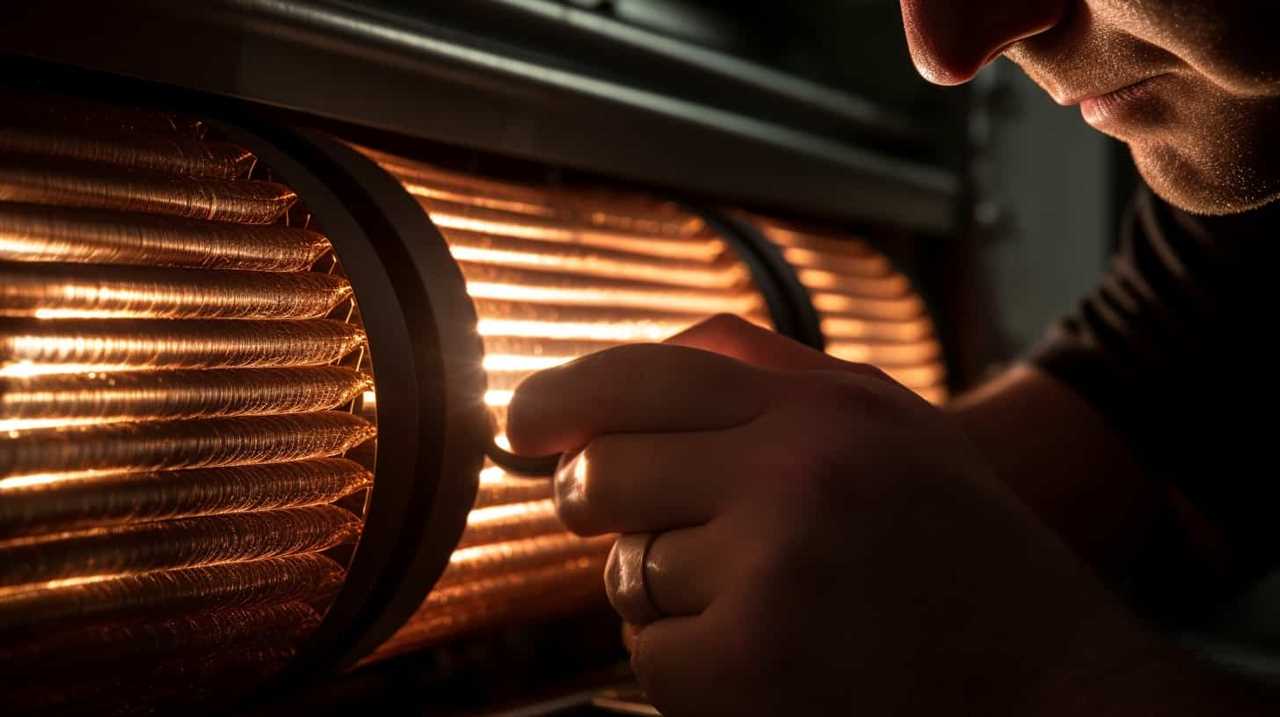
One such advancement is the integration of smart technology into HVAC systems with heat pumps. These smart systems allow for remote control and monitoring, optimizing energy usage and providing real-time data on energy consumption. Additionally, smart technology enables the integration of renewable energy sources, such as solar panels, to power heat pumps, further reducing reliance on traditional energy sources.
Frequently Asked Questions
Can a High-Quality HVAC System With a Heat Pump Be Used in Both Residential and Commercial Buildings?
Yes, a high-quality HVAC system with a heat pump can be used in both residential and commercial buildings. The installation requirements may vary depending on the size and usage of the space.
Are There Any Government Incentives or Rebates Available for Investing in Top-Rated HVAC Systems With Heat Pumps?
Yes, there are government incentives and rebates available for investing in top-rated HVAC systems with heat pumps. These incentives aim to promote energy efficiency and provide financial support to encourage the adoption of high-quality HVAC systems.
How Do I Determine the Appropriate Size of an HVAC System With a Heat Pump for My Home or Building?
To determine the appropriate size of an HVAC system with a heat pump for our home or building, we should consider factors such as square footage, insulation, and climate conditions. Professional calculations and assessments can provide accurate recommendations.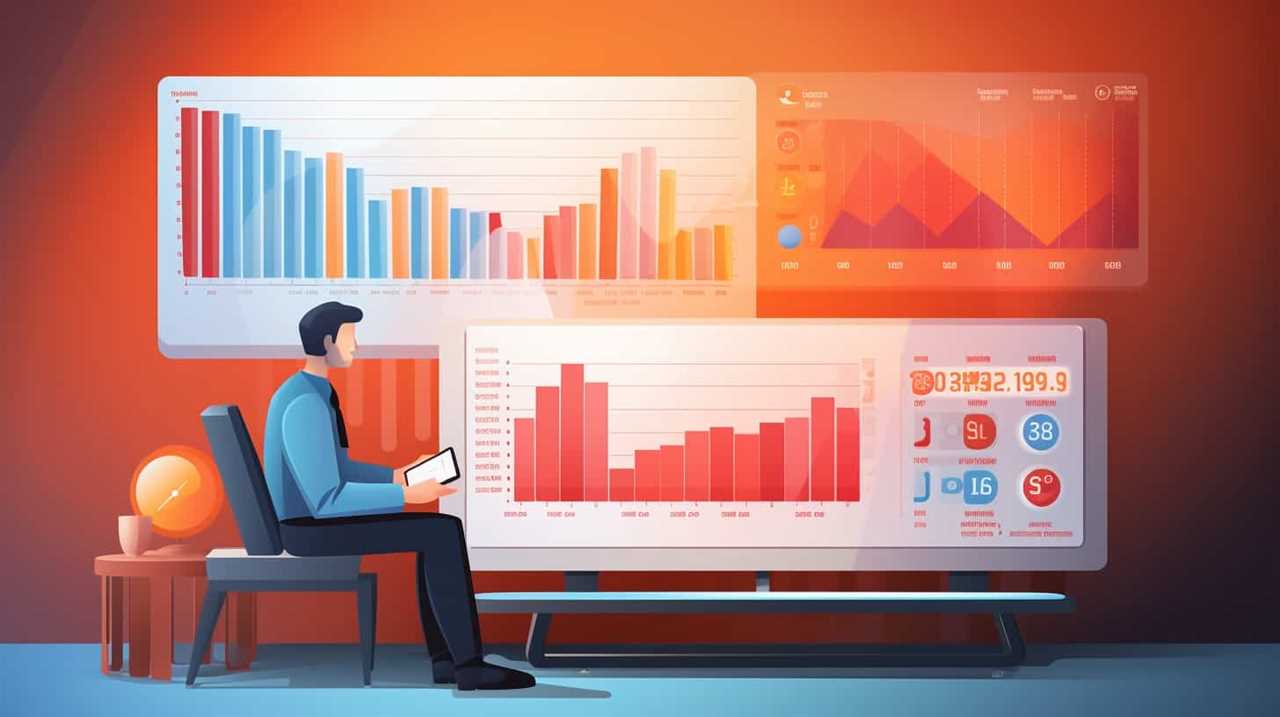
What Are Some Common Issues That Can Occur With HVAC Systems With Heat Pumps, and What Troubleshooting Tips Can You Provide?
Common issues with HVAC systems with heat pumps include airflow problems, refrigerant leaks, and thermostat malfunctions. To troubleshoot, check air filters, inspect refrigerant lines for leaks, and ensure the thermostat is set correctly.
What Innovative Technologies Are Being Used in Modern HVAC Systems With Heat Pumps, and How Do They Improve Efficiency and Performance?
Inverter technology and smart thermostats are two key innovative technologies used in modern HVAC systems with heat pumps. They greatly improve efficiency and performance by allowing for precise control and adjustment of heating and cooling output.
What Are the Top-Rated HVAC Systems with Heat Pumps on the Market?
Looking for the best premium-rated hvac systems with heat pumps on the market? Look no further! We’ve compiled a list of the top-rated options currently available. These systems offer efficient heating and cooling, superb energy-saving features, and reliable performance. With advanced technology and innovative designs, you can trust these top-rated HVAC systems with heat pumps to keep your home comfortable all year long.
Conclusion
In conclusion, investing in high-quality HVAC systems with heat pumps is like having a superhero protecting your home’s comfort and energy efficiency. These systems offer a range of benefits, from efficient heating and cooling to energy-saving features.
By understanding the efficiency ratings and exploring different types of heat pumps, you can choose the perfect system for your needs. With innovative technologies and troubleshooting tips, these HVAC systems are the key to a comfortable and sustainable living space.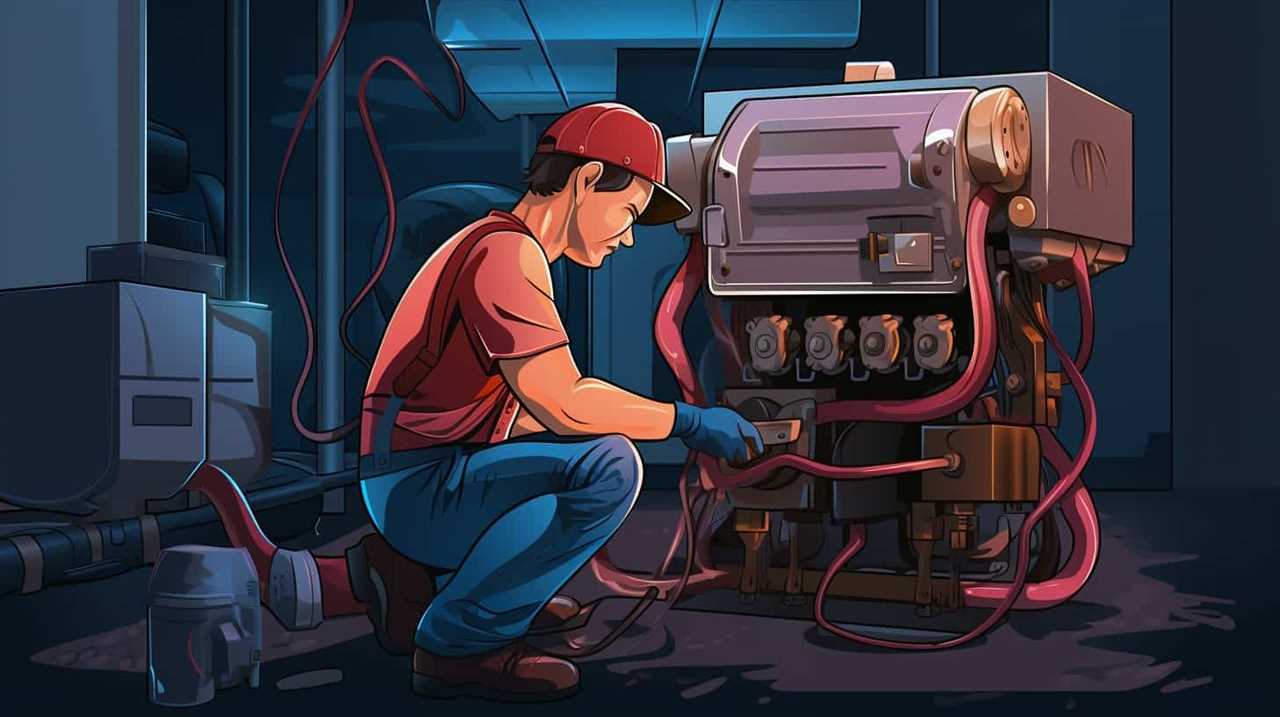
So, why settle for anything less than the best?
-

 Residential and Commercial Applications6 months ago
Residential and Commercial Applications6 months agoBest Amana Heat Pump Reviews
-

 Thermal Energy Transfer6 months ago
Thermal Energy Transfer6 months agoBreakthroughs in Modern Heat Pump Systems: Thermal Energy Edition
-

 Residential and Commercial Applications6 months ago
Residential and Commercial Applications6 months agoBest Heat Pump
-

 Geothermal Heat Pumps5 months ago
Geothermal Heat Pumps5 months agoUpgrade Your Comfort with Our Efficient HVAC Systems
-

 Geothermal Heat Pumps5 months ago
Geothermal Heat Pumps5 months agoInnovative Geothermal Heat Pump Manufacturers Revolutionize Energy Efficiency
-

 Air Conditioning4 months ago
Air Conditioning4 months agoExploring Energy-Efficient Air Conditioning Heat Pumps
-

 Thermal Energy Transfer3 months ago
Thermal Energy Transfer3 months agoBoost Your Heat Pump Efficiency: Interactive Guide
-

 Air Conditioning5 months ago
Air Conditioning5 months agoHeat Pumps Outperform Traditional Heating in Energy Use








